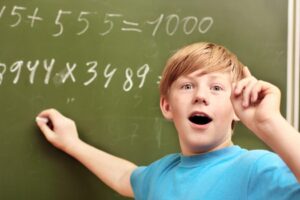
In recent years, the general parental obsession with foreign languages has been replaced by a passion for math including two-dimensional shapes. Now most fathers and mothers dream of raising their child to be a mathematical genius at any cost, against his or her own abilities and desires. And competition in the fifth grade in mathematics schools often exceeds the competition for the prestigious universities.
But not all junior high school students are capable of satisfying their parents’ ambitions. Faced with an impossible task, the fear of mathematics itself can mar even the most diligent student’s happy childhood.
The main question parents should ask themselves if a student who fails the elementary school math curriculum is: does he really need it? Many students at this age still have trouble understanding subtraction word problems what they are being asked to do when they are asked, say, to add fractions. What are fractions for? In fact, not all children can attend math schools and become great mathematicians. However, there are cases where the ability of the child really is, they are just not disclosed yet.
“First, you should try to arouse the child’s interest in the subject, to stimulate him somehow,” neuropsychologist Elena Charochkina advises, “Count with him everything you see around. Chairs, desks, how many people are in the class. Counting with candy works very well – it is worth offering the child to divide it among them. Let him see identify thirds and how much was missing, how much was left over, and how to divide the candy in a fair way, so that no one is offended. That is, to educate interest in mathematics through feelings and the so-called “vested interest”, to explain that without this science, he would be lost in life.
Only after causing interest in the “primary” student of arithmetic, it is worth moving on to the development of abstract thinking, from objects to numbers, to an understanding of the cause-effect relationship. There is an opinion among elementary school teachers that if a child in first grade is not counting in his head, but on his fingers in class, it is a sign of his unreadiness for school. “It’s not very nice to count by fingers, but it’s not a big problem,” says Elena Charochkina, “It’s just a sign that the child is not yet abstractly thinking. You have to give it time, let it do its best, it just hasn’t matured yet. Especially since children are not developing as quickly as before.
If a student is interested in learning, but no matter how much he sits over elementary examples, he does not get anything, it is worth going to a specialist to see what problems could be to blame. Everyone has heard about what dysgraphia is, about what lessons to overcome this problem are provided by speech therapists. Associated with mathematics is another concept – acalculia, in other words, difficulty performing mathematical actions in the mind.
Distracted attention, difficulty remembering, and acalculia can all be indicative of certain disorders. For example, it could be a violation of the interaction between the hemispheres of the brain. Having these problems, a child under stress will work worse, he will lack resources. Or, on the contrary, he will become an excellent student, but at the cost of severe emotional exhaustion. It is important for a specialist to determine what the student’s problem is and, if it is identified, to conduct lessons with him to help him cope with school math. During these “lessons,” the psychologist teaches the child to understand counting on a bodily level. For example, we learn the multiplication table by throwing a ball to each other a certain number of times. We learn to count with the help of steps on steps. Thus, gradually, he/she already starts to do all these calculations mentally.
acalculia can all be indicative of certain disorders. For example, it could be a violation of the interaction between the hemispheres of the brain. Having these problems, a child under stress will work worse, he will lack resources. Or, on the contrary, he will become an excellent student, but at the cost of severe emotional exhaustion. It is important for a specialist to determine what the student’s problem is and, if it is identified, to conduct lessons with him to help him cope with school math. During these “lessons,” the psychologist teaches the child to understand counting on a bodily level. For example, we learn the multiplication table by throwing a ball to each other a certain number of times. We learn to count with the help of steps on steps. Thus, gradually, he/she already starts to do all these calculations mentally.
It is interesting that another category of children who may have difficulties with the queen of sciences is just those who have an aptitude for technical subjects. These children often solve difficult problems from olympiads, but stumble on the most elementary ones. Psychologists explain this by the fact that in a simple example of such a child looking for and not finding a complex “grain”, and advise to distinguish between school and additional mathematics: go to additional classes, rather than asking the teacher to complicate his tasks within the school program.